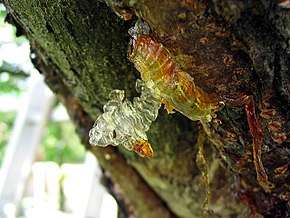resin
English

resin
Etymology
From Middle English resyn, resyne, borrowed from Old French résine, from Latin resīna.
Pronunciation
- IPA(key): /ˈɹɛzɪn/
Audio (US) (file) - Rhymes: -ɛzɪn
Noun
resin (countable and uncountable, plural resins)
- A viscous hydrocarbon secretion of many plants, particularly coniferous trees.
- Any of various yellowish viscous liquids or soft solids of plant origin; used in lacquers, varnishes and many other applications; chemically they are mostly hydrocarbons, often polycyclic.
- Any synthetic compound of similar properties.
Derived terms
- acaroid resin
- acrylic resin
- epoxy resin
- fossil resin
- gum resin
- Highgate resin
- ion exchange resin
- melamine resin
- nonresin
- oleoresin
- phenolic resin
- polyresin
- polyvinyl resin
- resinaceous
- resin acid
- resinate
- resinic
- resiniferous
- resinification
- resiniform
- resinify
- resinite
- resinless
- resinlike
- resinoid
- resinous
- resinously
- resiny
- thermoplastic resin
- urea-formaldehyde resin
Translations
secretion of plants
|
|
viscous liquid of plant origin
|
|
similar synthetic compound
- The translations below need to be checked and inserted above into the appropriate translation tables, removing any numbers. Numbers do not necessarily match those in definitions. See instructions at Wiktionary:Entry layout#Translations.
Verb
resin (third-person singular simple present resins, present participle resining, simple past and past participle resined)
- (transitive) To apply resin to.
Further reading
- “Resin” in David Barthelmy, Webmineral Mineralogy Database, 1997–.
Catalan
Chuukese
This article is issued from
Wiktionary.
The text is licensed under Creative
Commons - Attribution - Sharealike.
Additional terms may apply for the media files.